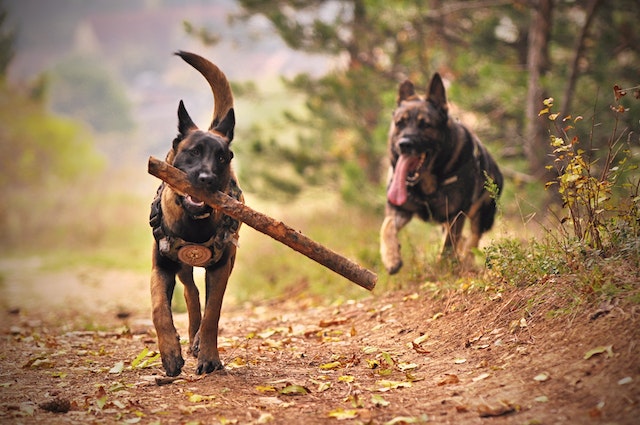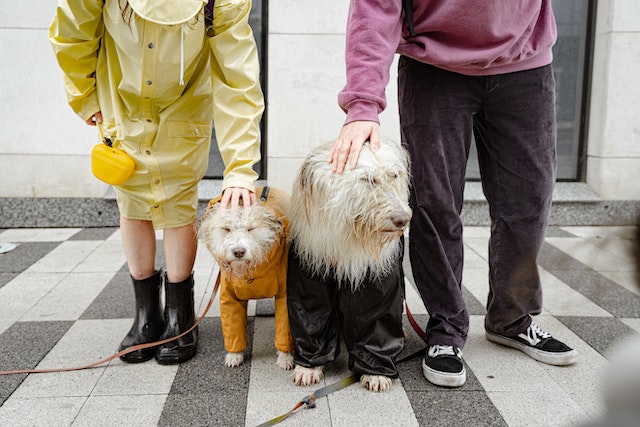Benefits of Owning a Dog | Stress Relieve and Health
Owning a dog can have many positive impacts on your physical and mental health. Here are some ways that dogs can be good for your health:
Exercise: Dogs need regular exercise, which means that dog owners are more likely to get outside and walk, run, or play with their pets. This increased physical activity can help improve cardiovascular health and reduce the risk of obesity.
Stress relief: Spending time with a dog can help reduce stress and anxiety levels. Petting and playing with a dog can release oxytocin, a hormone that can help reduce stress and promote relaxation.
Social connections: Owning a dog can help people build social connections, as they can provide opportunities for social interaction with other dog owners at parks and other public spaces.
Mental health: Dogs can also have a positive impact on mental health, including reducing symptoms of depression and anxiety. Studies have shown that interacting with a dog can increase levels of serotonin and dopamine, which can improve mood and emotional well-being.
Sense of purpose: Taking care of a dog can give people a sense of purpose and fulfillment, which can be particularly beneficial for older adults or those who live alone.
Dogs Help You Exercise
Dogs can be great motivators for exercise because they need regular physical activity to stay healthy and happy. Here are some ways that dogs can help you exercise:

Walking: Walking is one of the easiest ways to get exercise, and it’s something that you can do with your dog every day. Taking your dog for a walk can help you get outside, enjoy the fresh air and sunshine, and get some low-impact exercise.
Running: If you’re a runner, your dog can be a great running partner. Many dogs love to run, and they can help motivate you to keep going and push yourself a little harder.
Hiking: If you enjoy hiking, you can bring your dog along for the adventure. Hiking is a great way to get some exercise while enjoying nature, and many dogs love exploring new trails and environments.
Playing fetch: Playing fetch with your dog is a great way to get some exercise while also bonding with your pet. Throwing a ball or Frisbee for your dog to chase can help you get some cardio exercise, and it’s a fun way to spend time with your pet.
Agility training: If you’re looking for a more intense workout, you can try agility training with your dog. Agility training involves navigating obstacle courses with your dog, which can help improve your coordination, agility, and balance.
Start slowly and gradually increase your exercise routine to avoid injury.
Stress Relief

Dogs are known to be loyal, loving, and affectionate animals that provide companionship and emotional support to their owners. Here are a few ways in which dogs can help you with stress relief:
Physical touch and cuddles: Dogs love to cuddle and show affection, which can help reduce stress and anxiety levels. Physical touch has been shown to release the hormone oxytocin, which can lower cortisol (the stress hormone) levels.
Exercise: Taking your dog for a walk or playing with them can be a great way to get some exercise, which is a natural stress reliever. Physical activity can also increase endorphin levels, which are chemicals in the brain that promote a sense of well-being.
Companionship: Dogs are social animals and enjoy spending time with their owners. Having a loyal companion by your side can help reduce feelings of loneliness and provide a sense of comfort and security.
Mindfulness: Dogs live in the present moment and can help their owners focus on the here and now. Spending time with your dog can be a form of mindfulness practice, which can help reduce stress and anxiety.
Emotional support: Dogs are known to be intuitive and can sense when their owners are feeling stressed or anxious. They can provide emotional support and comfort during difficult times.
Social Connection
Dogs can be great facilitators of social connections and help their owners build relationships with others. Here are some ways in which dogs can help:

Meeting new people: Taking your dog for a walk or to the dog park can be a great way to meet new people who also have dogs. You already have something in common to talk about, and your dog can serve as a conversation starter.
Bonding with others: People who love dogs often feel an immediate connection with others who share their love of dogs. Your dog can help you form deeper connections with others who have similar interests.
Increased social support: Owning a dog can provide a sense of social support, especially for people who live alone. Dogs provide unconditional love and companionship, which can help people feel less isolated.
Volunteer opportunities: Many animal shelters and rescue organizations rely on volunteers to help care for animals. Volunteering can be a great way to meet like-minded people and give back to the community.
Improved communication: Dogs can help improve communication skills, particularly for children with autism or social anxiety. Interacting with dogs can help children develop social skills and build confidence.
Mental Health
Dogs can be very beneficial to your mental health in various ways. Here are some of the ways in which dogs can help:
Reduce stress and anxiety: Spending time with dogs can help reduce stress and anxiety levels. The physical presence of a dog can provide a sense of calm and comfort, and playing with them can help increase levels of dopamine and serotonin, two neurotransmitters that help regulate mood.
Increase happiness and well-being: Dogs are known to be very affectionate and loyal animals, and spending time with them can help increase feelings of happiness and well-being. This is due in part to the release of oxytocin, a hormone that is associated with social bonding and positive emotions.
Improve self-esteem: Caring for a dog can help improve self-esteem and feelings of self-worth. When you provide your dog with love and care, you feel a sense of purpose and responsibility that can boost your confidence and self-esteem.
Provide companionship: Dogs are social animals and can provide much-needed companionship, especially for people who live alone. Having a loyal companion by your side can help reduce feelings of loneliness and provide a sense of comfort and security.
Increase social support: As we discussed earlier that owning a dog can provide a sense of social support, especially for people who may be going through a difficult time. Dogs can provide unconditional love and companionship, which can be very comforting during times of stress or sadness.
Sense of Purpose
Dogs can give you a sense of purpose by providing you with a daily routine and a reason to get out of bed in the morning. Here are some ways in which dogs can give you a sense of purpose:

Responsibility: Caring for a dog requires a lot of responsibility, such as feeding them, providing them with exercise and mental stimulation, and taking them to the veterinarian for regular check-ups. Having a dog to care for can give you a sense of purpose and help you feel more accountable.
Routine: Dogs thrive on routine, and having a dog can help provide structure to your day. You’ll need to take your dog for walks, feed them on a regular schedule, and provide them with playtime and affection. This routine can help give you a sense of purpose and direction.
Training: Dogs require training to learn basic commands and behaviors, which can be a rewarding process for both you and your dog. Training your dog can give you a sense of purpose and accomplishment as you see your dog learn and grow.
Companionship: Dogs provide unconditional love and companionship, and having a loyal companion by your side can give you a sense of purpose and connection. Knowing that your dog relies on you for their well-being can give you a sense of importance and purpose.
Service work: Some dogs are trained to work in service roles, such as therapy dogs or guide dogs for people with disabilities. If you have a dog that is trained for service work, you can feel a sense of pride and purpose knowing that your dog is helping others.
Doglime for more information on owning dogs.










